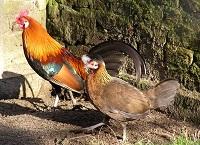Introduction

Animal personality is defined as individual behavioural differences that are relatively consistent across tasks and/or over time. Even though the interest for research on animal personality is increasing, what explains variation in personality is still unclear. A potential explanation is due to links with variation in cognition. Cognition refers to several mechanisms including the way animals process, store and act on information that is gathered from the environment. Cognitive processes thus including learning, memory and general decision making. Although a relationship between personality and cognition has been observed the causality of this relationship is not clear.
Theoretically, there are three possible ways for the relationship to take form. Firstly, there is no direct causality, but rather that there are common underlying mechanisms affecting both (Matzel et al., 2003; Light et al., 2008) such as common underlying neural control mechanisms (Coppens et al., 2010). Secondly, personality can affect cognition. For instance, an individuals’ personality can affect their performance in a learning task. More explorative and bold individuals, would perform better at a learning task. Due to being more explorative, the individual could therefore gather more information that is needed for completing the learning task (Light et al., 2008). Indeed, studies on guppies show that bolder individuals performed better at an associative learning task compared to shyer individuals (Dugatkin and Alfieri, 2003). Thirdly, variation in cognition may underlie and affect personality. For example, a cognitive experience might influence personality (Carere and Locurto, 2011). This reasoning is an alternative to the idea that exploration is driving learning, but instead learning is driving exploration (Light et al., 2011). However, experimental work investigating this possibility exclusively is still rare.
Therefore, the aim of my study was to further investigate the causality of the relationship between personality and cognition using the red junglefowl (Gallus gallus).
Responsible for this page:
Director of undergraduate studies Biology
Last updated:
06/15/16
